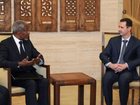Top officials from the United States, Russia, United Nations and European Union will meet Monday to discuss deadlocked efforts to end the Israel-Palestinian conflict, the U.N. said.
It will be the first top level meeting of the diplomatic Quartet in six months and comes amid a new flare-up in violence which has left at least 21 Palestinians dead in Israeli raids on the Gaza Strip since Friday.
 Full Story
Full Story
Iran stands fully behind Syria and blames the United States and Arab nations for the bloody unrest shaking its ally, media on Monday quoted a deputy foreign minister as saying.
"The Islamic Republic of Iran underlines its total support for the Syrian people and government," Hossein Amir Abdollahian said, according to Iran's official IRNA news agency.
 Full Story
Full Story
Lebanon decided not to join a meeting set to discuss support for the Syrian regime, which is expected to be held in the upcoming few days in Tehran, the pan-Arab daily al-Hayat reported on Monday.
The Iranian Foreign Ministry invited Lebanon, Iraq, and Syria to join the conference on March 18. However, Lebanon’s Foreign Minister Adnan Mansour, who received the invitation from his Iranian counterpart Ali Akbar Salehi, decided not to participate after discussions with President Michel Suleiman and Prime Minister Najib Miqati.
 Full Story
Full Story
The bodies of 47 women and children, some with their throats slit, were found in the flashpoint Syrian city of Homs prompting the opposition to call Monday for foreign military intervention.
The Syrian authorities accused "terrorist gangs" of carrying out the killings in a bid to intensify pressure on President Bashar al-Assad's regime at a meeting at the United Nations on Monday of foreign ministers of the major powers.
 Full Story
Full Story
Several Kuwaiti lawmakers have voiced strong objections to a planned visit to their country by Energy and Water Minister Jebran Bassil, noting that “he is an ardent supporter of the oppressive Syrian regime.”
“Bassil’s stances in support of the Syrian killing machine against the unarmed Syrian people make him unwelcome in Kuwait,” said MP Badr al-Dahoum, spokesman of the Justice parliamentary bloc, stressing that “guests who visit Kuwait must respect the official and popular stance on the Syrian regime.”
 Full Story
Full Story
At least 34 people, almost half of them civilians, were killed across Syria on Sunday as peace envoy Kofi Annan held a second round of talks with President Bashar al Assad, a monitoring group said.
The casualties comprised 15 civilians, 14 regular army soldiers and five rebel fighters, with most of the casualties occurring in the provinces of Idlib and Damascus and in the city of Hama, the Syrian Observatory for Human Rights said.
 Full Story
Full Story
Lebanon welcomes the Russian initiative on Syria that was adopted by Arab states during Saturday’s meeting in Cairo, Foreign Minister Adnan Mansour said on Sunday, while reiterating insistence on “Lebanon’s stances concerning the previous resolutions” passed by the Arab League.
“Lebanon welcomed the Russian initiative and the points agreed on with the Russian side, reiterating its stances on the previous resolutions,” Mansour said in Beirut, after taking part in the Cairo talks between Russian Foreign Minister Sergei Lavrov and his Arab counterparts.
 Full Story
Full Story
Hizbullah on Sunday claimed that “there are some March 14 associates in power who are involved in facilitating arming and infiltration into Syria,” describing the U.S. embassy in Lebanon as “a military operations room against Syria.”
“The countries that conspired against Syria have admitted that they had engaged in an uncalculated adventure and nowadays we’re noticing how they have started tactical, political retreats,” Sheikh Nabil Qaouq, deputy head of Hizbullah’s Executive Council, said.
 Full Story
Full Story
International peace envoy Kofi Annan emerged optimistic on Sunday from a second round of talks with President Bashar al-Assad, but warned that ending the bloodshed in Syria would be "tough."
"It's going to be tough, it's going to be difficult, but we have to have hope. I am optimistic," Annan told reporters in Damascus after the meeting.
 Full Story
Full Story
The Obama administration and its allies are engaged in serious discussions about potential military involvement in Syria, The Washington Post quoted officials as saying.
“Possibilities include directly arming opposition forces, sending troops to guard a humanitarian corridor or “safe zone” for the rebels, or an air assault on Syrian air defenses,” according to the officials from the U.S. and other nations opposed to Syrian President Bashar Assad.
 Full Story
Full Story



